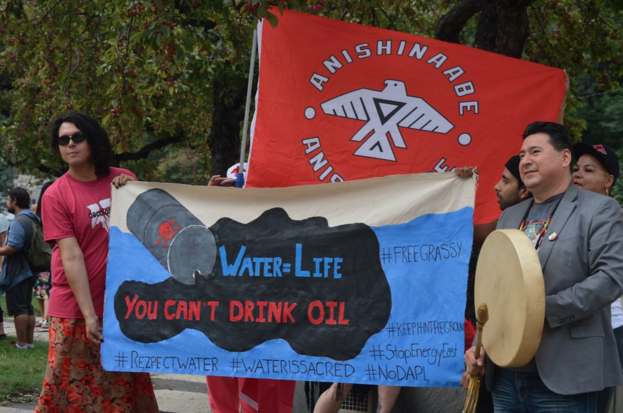Solidarity demonstrators gathered outside of the United States consulate in Toronto yesterday morning to support the Standing Rock Sioux community protesting the Dakota Access Pipeline.
Members of the Dakota and Lakota nations established the Sacred Stone encampment near the confluence of the Missouri and Cannonball rivers to protest the pipeline, a $3.8 billion project that extends through Indigenous burial grounds.
Since April, the encampment has attracted thousands of allies. Last Saturday, security guards attacked protesters with dogs and pepper spray as construction on the pipeline continued.
“Today is about standing up for anywhere where Native peoples are resisting,” Jay Mason, a Mohawk activist, told rabble. “The main thing we need to do is make sure that the world’s attention is focused on what’s happening down there,” Mason said.
Protesters asked to relocate
At 8:30 a.m. on Thursday morning, around 40 people arrived at the U.S. consulate in Toronto on University Avenue between Dundas and Queen street.
“The numbers grew, I think overall we had about 100 people show up,” Teddy Syrette, a co-organizer of yesterday’s rally, told rabble.
The consulate’s security guards asked the protesters to vacate the sidewalk directly outside of the consulate and move to the median on University Avenue.
“We thought, oh that’s so fitting, because First Nations people are always asked to move and relocate to different land. A lot of people were irked by that,” Syrette explained.
Once relocated, “we were able to occupy the space and big drum,” Syrette said. Protesters walked with hand drums and held hands while singing songs and chanting.
Before the big drum wrapped up, the group did two round dances in the meridian, and one on the sidewalk outside of the consulate with the help of the security guards. The rally wrapped up around noon.
Yesterday’s rally is the second to take place at the consulate in less than a month. Each rally has had different organizers and different outreach, but the same unifying cause.
Cross-border, inter-generational conversations
Yesterday’s protest in Toronto is just one example of solidarity actions sweeping Canada. A similar rally outside the U.S. consulate in Montreal took place yesterday morning, and Indigenous people from Winnipeg have travelled to Standing Rock.
“For us, solidarity is so important, no matter what your Nation is, no matter where you’re from, no matter where you are,” Jacob Parcher, Program Coordinator of 2 Spirit/LGBTQ Indigenous Youth group ODE: Remembered Voices, told rabble.
Parcher explained that the border between the United States and Canada is arbitrary: “an invisible line does not make it a border,” he said.
Large-scale pipelines and environmentally destructive projects are not exclusively American issues, Mason explained. “The Saskatchewan River is polluted by Husky Oil. We’ve got fracking issues out east, water being poisoned across the board. Look at how many oil spills there [have] been in the lakes and rivers. And they’re not stopping, they’re attacking the waters,” Mason said.
“To us, that’s the heart of the turtle up there, that’s where all the waters come in, into these Great Lakes and then they go back out to the rest of Turtle Island, all the veins and arteries. And they want to mess with that,” Mason continued.
Parcher hopes that ODE: Remembered Voices will inspire Indigenous youth to take up the fight for clean water.
“This is going to affect everybody, not just [Indigenous communities.] These corporations, companies and banks are only thinking about the present. They’re not thinking about what they’re doing to their future generations,” Wasse Abino Kwe, an Indigenous youth activist and member of ODE: Remembered Voices, told rabble.
“And we’re always cognizant of our seven generations ahead,” Parcher interjected.
Mason has been protesting for Indigenous rights since the 1970s. “I’ve been waiting a long time for a massive paradigm shift to hit these invaders. It’s not happening as quick as it has to,” Mason said.
Issues have not changed much since the 70s, Mason says. “All we’ve got now is a new established Indian class system, where we have an upper middle class and we have a poor class, that’s the only thing that’s really changed.”
But for Mason, apologies, small programs, and empty promises are not enough to enact meaningful change. “An apology without atonement is an excuse to do it again,” Mason says.
Like this article? rabble is reader-supported journalism. Chip in to keep stories like these coming.
Sophia Reuss is a Montreal-based writer, editor, and is a recent graduate of McGill University. She’s interested in how online media and journalism facilitate public accessibility and conversation. Sophia also writes and edits for the Alternatives International Journal. She was rabble’s 2016 summer intern.



